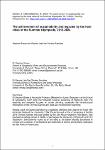The achievement of sustainability and legacies by the host cities of the Summer Olympiads, 2012–2024
| dc.contributor.author | Essex, S | |
| dc.contributor.author | Latuf de Oliveira Sanchez, R | |
| dc.date.accessioned | 2024-04-10T15:56:42Z | |
| dc.date.available | 2024-04-10T15:56:42Z | |
| dc.date.issued | 2024-04-06 | |
| dc.identifier.issn | 0266-5433 | |
| dc.identifier.issn | 1466-4518 | |
| dc.identifier.uri | https://pearl.plymouth.ac.uk/handle/10026.1/22268 | |
| dc.description.abstract |
Since the emergence of the concept of sustainable development, the Olympic Games have become a vehicle to demonstrate and promote the principles and practices of sustainability. The aim of this paper is to explain and evaluate how the application of sustainable development in the context of the Summer Olympic Games has evolved. Two processes have been influential in this change: first, the institutional expectations of the International Olympic Committee have encouraged greater responsibility towards the creation of legacies by potential host cities through the IOC Charter, the Olympic Agenda 2020, and the Olympic Agenda 2020+5; and second, the context and inventiveness of host cities has created new perspectives on sustainability to secure the event and raise its global profile. This paper will focus on the sustainability benchmarks established in London 2012 and evaluate whether these have been continued or extended in the subsequent editions of the Summer Games in Rio de Janeiro (2016), Tokyo (2021) and Paris (2024). The changing discourses reveal the tensions between the IOC’s agendas for the event, the motivations of the host cities and the realities of delivery in changing socio-economic and political circumstances. | |
| dc.format.extent | 1-19 | |
| dc.language | en | |
| dc.publisher | Informa UK Limited | |
| dc.subject | Olympics | |
| dc.subject | sustainability | |
| dc.subject | legacy | |
| dc.subject | International Olympic Committee | |
| dc.title | The achievement of sustainability and legacies by the host cities of the Summer Olympiads, 2012–2024 | |
| dc.type | journal-article | |
| dc.type | Article | |
| dc.type | Early Access | |
| plymouth.issue | ahead-of-print | |
| plymouth.volume | ahead-of-print | |
| plymouth.publisher-url | http://dx.doi.org/10.1080/02665433.2024.2334077 | |
| plymouth.publication-status | Published online | |
| plymouth.journal | Planning Perspectives | |
| dc.identifier.doi | 10.1080/02665433.2024.2334077 | |
| plymouth.organisational-group | |Plymouth | |
| plymouth.organisational-group | |Plymouth|Research Groups | |
| plymouth.organisational-group | |Plymouth|Research Groups|Centre for Research in Environment and Society (CeRES) | |
| plymouth.organisational-group | |Plymouth|Faculty of Science and Engineering | |
| plymouth.organisational-group | |Plymouth|Faculty of Science and Engineering|School of Geography, Earth and Environmental Sciences | |
| plymouth.organisational-group | |Plymouth|Research Groups|Marine Institute | |
| plymouth.organisational-group | |Plymouth|Research Groups|Centre for Research in Environment and Society (CeRES)|CeRES (Reporting) | |
| plymouth.organisational-group | |Plymouth|REF 2021 Researchers by UoA | |
| plymouth.organisational-group | |Plymouth|Users by role | |
| plymouth.organisational-group | |Plymouth|Users by role|Current Academic staff | |
| plymouth.organisational-group | |Plymouth|REF 2021 Researchers by UoA|UoA14 Geography and Environmental Studies | |
| plymouth.organisational-group | |Plymouth|REF 2029 Researchers by UoA | |
| plymouth.organisational-group | |Plymouth|REF 2029 Researchers by UoA|UoA14 Geography and Environmental Studies | |
| dcterms.dateAccepted | 2024-03-19 | |
| dc.date.updated | 2024-04-10T15:56:42Z | |
| dc.rights.embargodate | 2024-4-13 | |
| dc.identifier.eissn | 1466-4518 | |
| rioxxterms.versionofrecord | 10.1080/02665433.2024.2334077 |


